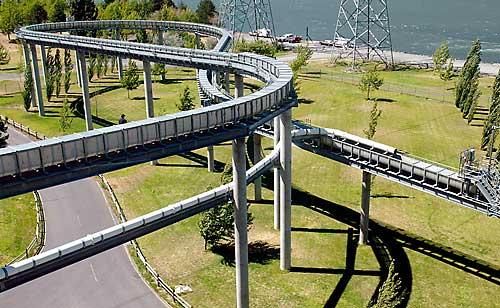forum
library
tutorial
contact

BPA Seeks Reduced Spill
at Columbia Basin Dams
by Jeff Barnard, Associated Press
Seattle Times, March 31, 2004
|
the film forum library tutorial contact |

|
BPA Seeks Reduced Spill
by Jeff Barnard, Associated Press
|
GRANTS PASS, Ore. -- Hoping to earn up to $45 million more in electricity sales to markets outside the Northwest, the Bonneville Power Administration proposed reducing the amount of water it spills over Columbia Basin hydroelectric dams which helps young threatened salmon migrate to the ocean.
Speaking at a telephone news conference from Portland, BPA Administrator Steve Wright said yesterday that the agency was counting on other measures to offset the losses of an estimated three to 22 threatened adult Snake River fall chinook and thousands of other Columbia Basin salmon while allowing BPA to earn enough money to reduce an expected rate increase.
 "The goal here is mission accomplished at the least possible cost," Wright said.
"The goal here is mission accomplished at the least possible cost," Wright said.
The proposal met with strong criticism from Indian tribes holding treaty rights to harvest Columbia Basin salmon and from salmon-conservation groups.
Robert Lohn, Northwest administrator of NOAA Fisheries, which must decide on the proposal, said the agency was willing to consider steps to cut BPA's costs if they cause no net harm to Snake River fall chinook.
The idea of spilling more water over dams to keep young salmon out of hydroelectric turbines dates back a decade and is incorporated in the 2000 biological opinion by NOAA Fisheries on operating Columbia Basin dams without undue harm to salmon protected by the Endangered Species Act. The turbines kill about 10 percent of the fish that go through them.
If the proposal is approved by NOAA Fisheries, the groups contend it might land on the desk of U.S. District Judge James Redden, who has declared the 2000 biological opinion for operating Columbia Basin dams illegal.
"It puts the region at an enormous risk of backsliding on the (salmon) restoration progress made to date by eliminating the safest means for moving juvenile fish through a hostile hydro system," said Charles Hudson, spokesman for the Columbia River Inter-Tribal Fish Commission.
"By any scientific and fairness evaluation, this proposal flunks," said Jim Martin, conservation director for PureFishing and former fisheries chief for the Oregon Department of Fish and Wildlife.
The governors of Washington, Oregon, Idaho and Montana issued a statement saying they would support ways to boost power production to help the region's economy as long as they don't harm salmon.
The proposal calls for eliminating spills over Ice Harbor Dam on the Snake River and John Day, The Dalles and Bonneville dams on the Columbia during the month of August and at Ice Harbor in the last half of July.
The cost of alternative steps to protect fish run from $5 million to $15 million. One alternative is reducing the numbers of northern-pike minnows, a leading predator of young salmon. That might include increasing the $3 bounty paid to sport fishermen, Wright said.
The other is controlling dam releases into the Hanford Reach of the Columbia River in Washington to reduce the numbers of young salmon stranded when water levels fall rapidly.
Wright said BPA anticipates having to seek a 5 percent rate increase this October, and the increased revenues from putting more water through turbines could offset that by 2 to 4 percentage points.
The proposal would likely result in the loss of 545 Snake River fall-chinook smolts, which represents three to 22 returning adults, said Brig. Gen. William T. Grisoli, commander of the U.S. Army Corps of Engineers Northwestern Division. Another 226,000 salmon smolts from the Hanford Reach of the Columbia River, representing 1,300 to 10,000 returning adults, and 224,000 salmon smolts not protected by the Endangered Species Act, representing 1,200 to 9,800 adult fish, could also be lost, Grisoli said.
Opponents of plan to dredge stretch of Columbia file suit
Opponents of a plan to deepen a 103-mile stretch of the Columbia River filed a lawsuit yesterday, challenging the federal government's approval of the $136 million project.
Earthjustice, a public-interest law firm representing Northwest Environmental Advocates, argued that dredging 3 feet from the river's 600-foot-wide shipping channel from the Pacific Ocean to Portland would devastate salmon habitat and worsen erosion of Washington and Oregon beaches.
"This project is wrong for salmon and other species, it's wrong for Washington and Oregon, and it's wrong for the American taxpayers," said Nina Bell, executive director of Northwest Environmental Advocates.
Brian Gorman, spokesman for the National Oceanic and Atmospheric Administration's Fisheries office in Seattle, said the agency had not reviewed the lawsuit yet and he could not comment on it. But he noted that when NOAA Fisheries approved the plan in May 2002, it stated that restoring salmon habitat is a priority.
bluefish does the math for your convenience: BPA estimates that eliminating summer spill would provide 1.15 - 1.49 million Megawatt*hours (MWh) of "surplus" electricity to sell (typically to California) at an estimated average price of $32/MWh (yielding $37 - $46 million). Prices of course will vary with time of day and electricity market conditions. BPA estimates that elimination of summer spill could potentially provide a 2% electricity rate reduction.
learn more on topics covered in the film
see the video
read the script
learn the songs
discussion forum
